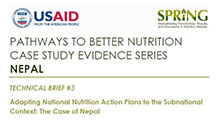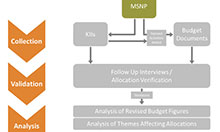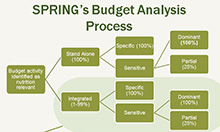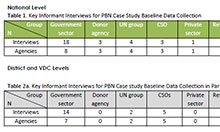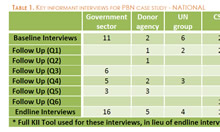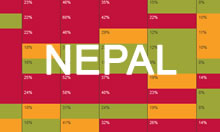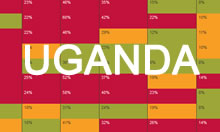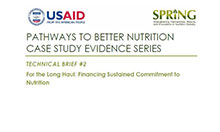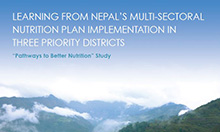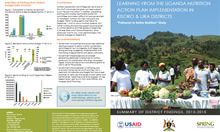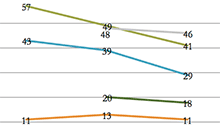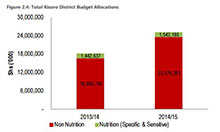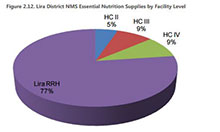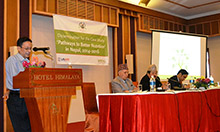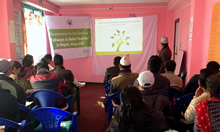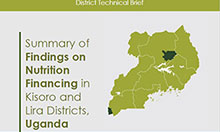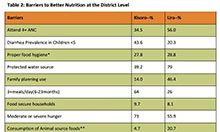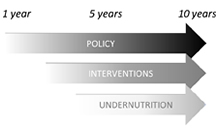Study Overview
A multi-sectoral approach is often thought to be the most effective way to address undernutrition.
Recent evidence has demonstrated the importance of good nutrition to both human and economic development, as well as the role good governance and policy have in creating momentum for nutrition. However, questions remain about the best ways to move from good nutrition policy to improved nutrition outcomes.
SPRING’s Pathways to Better Nutrition (PBN) Case Studies provide new evidence in this area. They explore how nutrition-related activities are prioritized and funded, focusing on the effect that national nutrition action plans (NNAPs) have on these processes in two different contexts: Uganda and Nepal. Having a NNAP is an important first step; however, it is not enough for achieving nutrition goals at scale. To translate the high level commitment signaled in a NNAP to new activities and increased funding, nutrition needs to be prioritized by the relevant ministries, local governments, and external partners. The hypothesis we set out to test was that the NNAP will improve the prioritization of nutrition during work planning, which will in turn increase funding for nutrition over the course of the study’s tenure. The goal is to identify some concrete drivers of change in the prioritization and funding for nutrition.
A 360 Degree View
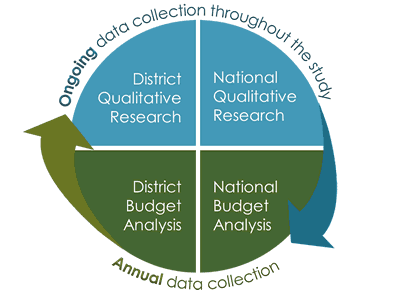
The PBN Case Studies take an innovative approach to documenting the influence of multi-sectoral NNAPs, as shown in figure (right), at the national level and in a few case districts. Qualitative data were collected primarily through periodic in-depth interviews and from news content analysis conducted on a weekly basis. Publicly available budget data were also analyzed on an annual basis. Data were collected from stakeholders representing the government, donors, UN groups, the private sector, academia, and civil society. This provided a 360 degree view of the changes in perceptions, events, and funding related to nutrition and the NNAP in each context.
Country-driven Research
Our research was done in partnership with the nutrition secretariats in Uganda and Nepal. Both countries have developed truly multi-sectoral NNAPs and are actively implementing these plans. Because our country-driven research takes place over multiple years, we provide a rare time-series view of changes in planning processes and funding mechanisms for nutrition. Evidence from these studies can be used by each country to determine best practices, identify barriers, and enhance monitoring and evaluation.
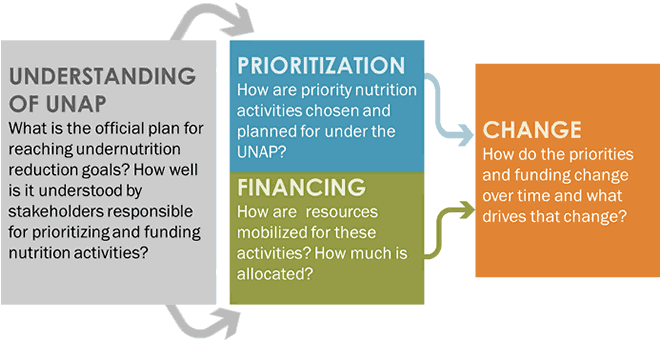
Although every country context is different, countries with nutritional, demographic, political and economic characteristics similar to those of Nepal and Uganda can apply these lessons in their own efforts to build a successful national multi-sectoral, multi-stakeholder nutrition effort.
Looking Ahead
All active data collection in both countries has just concluded, and full results will be available in early 2016.
This collaborative research should help to support more effective advocacy efforts, more funding transparency, and clearer negotiation for funding within various ministries, donor and UN agencies, and by the private sector in each country.
Want to better-understand the organization of these studies? Click on this (pops out).
Reporting and List of Related Resources
Throughout our research, we have produced a variety of briefs, background reports and annexes. As our research is on-going, some of these materials are not yet available; please continue to check this page to stay up-to-date with our research:
Methodology Annexes: provide an in-depth description of methods for each country:
- Nepal:
- Uganda:
Snapshots: Secondary survey analysis providing a description of the NNAP indicators and drivers of nutrition sub-regionally and at the district level in both countries:
- Nepal
- Sub-Regional Snapshots “Factors Affecting Nutrition around Nepal”
- District Level Snapshots for Achham (PDF, 2 MB), Kapilvastu (PDF, 1 MB) and Parsa (PDF, 2 MB)
- Summary of District Findings "Learning from Nepal's Multi-Sectoral Nutrition Plan Implementation in Three Priority Districts"
- Uganda
- Sub-Regional Snapshots “Factors Affecting Nutrition around Uganda”
- District Level Snapshots for Kisoro (PDF, 384 KB) and Lira (PDF, 381 KB)
- Overview of District Findings "Learning from the Uganda Nutrition Action Plan Implementation in Kisoro and Lira Districts"
Interim Technical Briefs: These briefs highlight early findings prior to end of our study. They do not reflect the full scope of the study or research questions, but rather give a sneak peek of one topic/key factor that emerged as important in our data:
- Understanding Scale-up in the Context of the Ugandan Nutrition Action Plan
- For the Long Haul: Financing Sustained Commitment to Nutrition
- Adapting National Nutrition Action Plans to the Subnational Context: The Case of Nepal
- Toward Shared Goals: Building Multi-sectoral Coordination in Uganda
District Technical Briefs: Final reporting for district level data - these data are also included in the final reports:
- Nepal
- Achham (PDF 1.6 MB) final dissemination presentation
- Kapilvastu (PDF 1.4 MB) final dissemination presentation
- Parsa (PDF 1.4 MB) final dissemination presentation
- Uganda
- District Technical Brief: Summary of Qualitative Findings in Kisoro and Lira Districts, Uganda - 2014 and 2015
- District Technical Brief: Summary of Findings on Nutrition Financing in Lira and Kisoro Districts, UGANDA – 2013/2014 and 2014/15 Fiscal Year
- District Technical Brief: Report on Nutrition Financing in Lira District, Uganda
- District Technical Brief: Report on Nutrition Financing in Kisoro District, Uganda
Final Study Reports: Final reporting on the five study questions, across all data streams and across national and district data:
- Nepal Final Study Report
- Uganda Final Study Report
